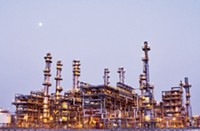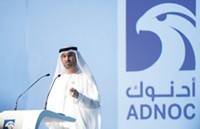Advertisement
Grab your lab coat. Let's get started
Welcome!
Welcome!
Create an account below to get 6 C&EN articles per month, receive newsletters and more - all free.
It seems this is your first time logging in online. Please enter the following information to continue.
As an ACS member you automatically get access to this site. All we need is few more details to create your reading experience.
Not you? Sign in with a different account.
Not you? Sign in with a different account.
ERROR 1
ERROR 1
ERROR 2
ERROR 2
ERROR 2
ERROR 2
ERROR 2
Password and Confirm password must match.
If you have an ACS member number, please enter it here so we can link this account to your membership. (optional)
ERROR 2
ACS values your privacy. By submitting your information, you are gaining access to C&EN and subscribing to our weekly newsletter. We use the information you provide to make your reading experience better, and we will never sell your data to third party members.
Business
Middle East: The Region Wants To Beat Its Cracker Addiction
by Alexander H. Tullo
January 10, 2011
| A version of this story appeared in
Volume 89, Issue 2
After years of delays and operational difficulties, a long-anticipated 7 million-metric-ton-per-year slug of Middle Eastern petrochemical capacity finally came on-line in 2010. But to maintain its growth, the region will need to expand beyond simple ethylene derivatives.
COVER STORY
Middle East: The Region Wants To Beat Its Cracker Addiction
Three affiliates of Saudi Basic Industries Corp. (SABIC) inaugurated ethylene crackers and derivatives units during the year. Projects also started up in Iran, Qatar, and the United Arab Emirates.
At a press conference in October 2010, SABIC CEO Mohamed H. Al-Mady acknowledged that his company wasn’t immune to the region’s construction woes. Two of SABIC’s affiliates—dubbed Sharq and Yansab—encountered minor project delays, he said, and its Saudi Kayan joint venture faced cost overruns. “The engineering contractors were being stressed thin in the area,” Al-Mady said, adding that other firms faced delays of up to two years.
Leslie McCune, managing director of the Middle East-focused consulting firm Chemical Management Resources, says SABIC has more experience bringing projects on-line than its regional competitors.
Even in the Middle East, feedstocks are becoming increasingly scarce, and Middle Eastern producers are trying to extract more value from the resources they have. McCune says the producers are increasingly emphasizing operational reliability, efficiency, supply chain management, and other value-enhancement practices that are common elsewhere in the world. “The value drive is being more heavily expressed in the Middle East, where the focus has been more on iconic projects,” he says.
The feedstock problem is acute, McCune says. For example, Saudi Arabia currently turns out about 8.5 million barrels of oil per day, he says. But to yield enough associated ethane to feed its crackers, the country needs to produce about 10 million bbl of oil.
Thus, the industry is looking beyond its current model of pushing ethane through crackers to supply plants that make polyethylene and other basic derivatives. It aims to balance its feedstock diet with heavy liquids and also produce more value-added products such as specialty chemicals and engineering polymers.
Last month, Khalid A. Al-Falih, CEO of Saudi Aramco, told a Gulf Petrochemicals & Chemicals Association forum that the region’s chemical business could do better. “When we consider downstream conversion and finished products—that is, areas of the value chain that are much richer in terms of value and employment potential—the broader region has a lot of catching up to do,” he said.






Join the conversation
Contact the reporter
Submit a Letter to the Editor for publication
Engage with us on Twitter